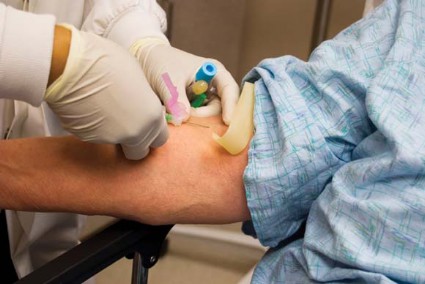User login
Medicare will cover screening for hepatitis C virus infection in high-risk beneficiaries, including a one-time screening for all beneficiaries born between 1946 and 1964, according to a national coverage decision announced June 2.
High risk is defined in the coverage memo as persons who have "a current or past history of illicit injection drug use; and persons who have a history of receiving a blood transfusion prior to 1992." To be covered, screening must be ordered by the beneficiary’s primary care physician or another practitioner within the primary care setting.
Annual rescreening is also covered for high-risk beneficiaries who continue to use illicit injection drugs, according to the decision memo.
The Centers for Medicare & Medicaid Services proposed the coverage, which follows U.S. Preventive Services Task Force recommendations for screening in March. That proposal followed an overwhelmingly positive response to the agency’s initial consideration of coverage for HCV screening in September 2013.
Treatment options for hepatitis C are expanding, with FDA approving three protease inhibitors in recent years – boceprevir (Victrelis), telaprevir (Incivek), and simeprevir (Olysio) – for treatment of patients with genotype 1 infection. Each of these treatments can be used in combination with pegylated interferon and ribavirin for the treatment of genotype 1 infection.
Last year, FDA approved sofosbuvir (Sovaldi), indicated for infections from genotypes 1, 2, 3, or 4, although access is hindered by its cost: $84,000 for a 12-week course of treatment ($1,000 a pill).
Medicare will cover screening for hepatitis C virus infection in high-risk beneficiaries, including a one-time screening for all beneficiaries born between 1946 and 1964, according to a national coverage decision announced June 2.
High risk is defined in the coverage memo as persons who have "a current or past history of illicit injection drug use; and persons who have a history of receiving a blood transfusion prior to 1992." To be covered, screening must be ordered by the beneficiary’s primary care physician or another practitioner within the primary care setting.
Annual rescreening is also covered for high-risk beneficiaries who continue to use illicit injection drugs, according to the decision memo.
The Centers for Medicare & Medicaid Services proposed the coverage, which follows U.S. Preventive Services Task Force recommendations for screening in March. That proposal followed an overwhelmingly positive response to the agency’s initial consideration of coverage for HCV screening in September 2013.
Treatment options for hepatitis C are expanding, with FDA approving three protease inhibitors in recent years – boceprevir (Victrelis), telaprevir (Incivek), and simeprevir (Olysio) – for treatment of patients with genotype 1 infection. Each of these treatments can be used in combination with pegylated interferon and ribavirin for the treatment of genotype 1 infection.
Last year, FDA approved sofosbuvir (Sovaldi), indicated for infections from genotypes 1, 2, 3, or 4, although access is hindered by its cost: $84,000 for a 12-week course of treatment ($1,000 a pill).
Medicare will cover screening for hepatitis C virus infection in high-risk beneficiaries, including a one-time screening for all beneficiaries born between 1946 and 1964, according to a national coverage decision announced June 2.
High risk is defined in the coverage memo as persons who have "a current or past history of illicit injection drug use; and persons who have a history of receiving a blood transfusion prior to 1992." To be covered, screening must be ordered by the beneficiary’s primary care physician or another practitioner within the primary care setting.
Annual rescreening is also covered for high-risk beneficiaries who continue to use illicit injection drugs, according to the decision memo.
The Centers for Medicare & Medicaid Services proposed the coverage, which follows U.S. Preventive Services Task Force recommendations for screening in March. That proposal followed an overwhelmingly positive response to the agency’s initial consideration of coverage for HCV screening in September 2013.
Treatment options for hepatitis C are expanding, with FDA approving three protease inhibitors in recent years – boceprevir (Victrelis), telaprevir (Incivek), and simeprevir (Olysio) – for treatment of patients with genotype 1 infection. Each of these treatments can be used in combination with pegylated interferon and ribavirin for the treatment of genotype 1 infection.
Last year, FDA approved sofosbuvir (Sovaldi), indicated for infections from genotypes 1, 2, 3, or 4, although access is hindered by its cost: $84,000 for a 12-week course of treatment ($1,000 a pill).

